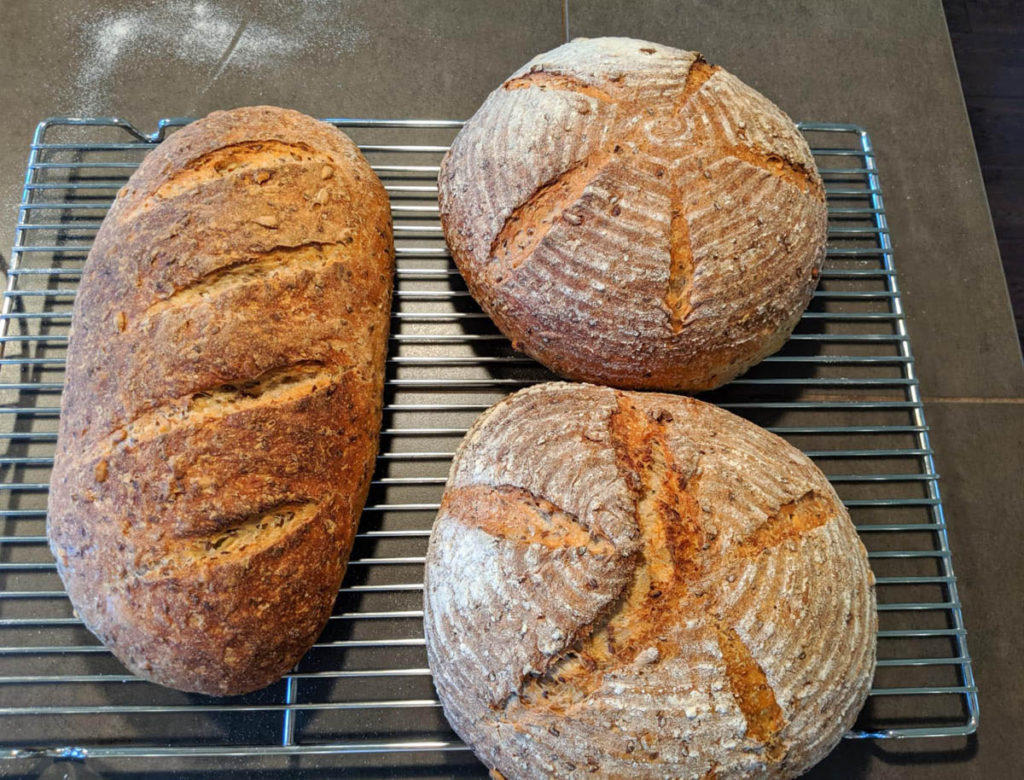I could blame my cousin for it, or I could blame my friend Dante but the truth is that I can only blame my curiosity, my constant efforts to improve my diet, to try something new, and to challenge myself.
It all started a few years ago and, slowly by surely, it has developed into an almost addictive passion.
At this point you might be wondering what put in motion the wheels of my brain:
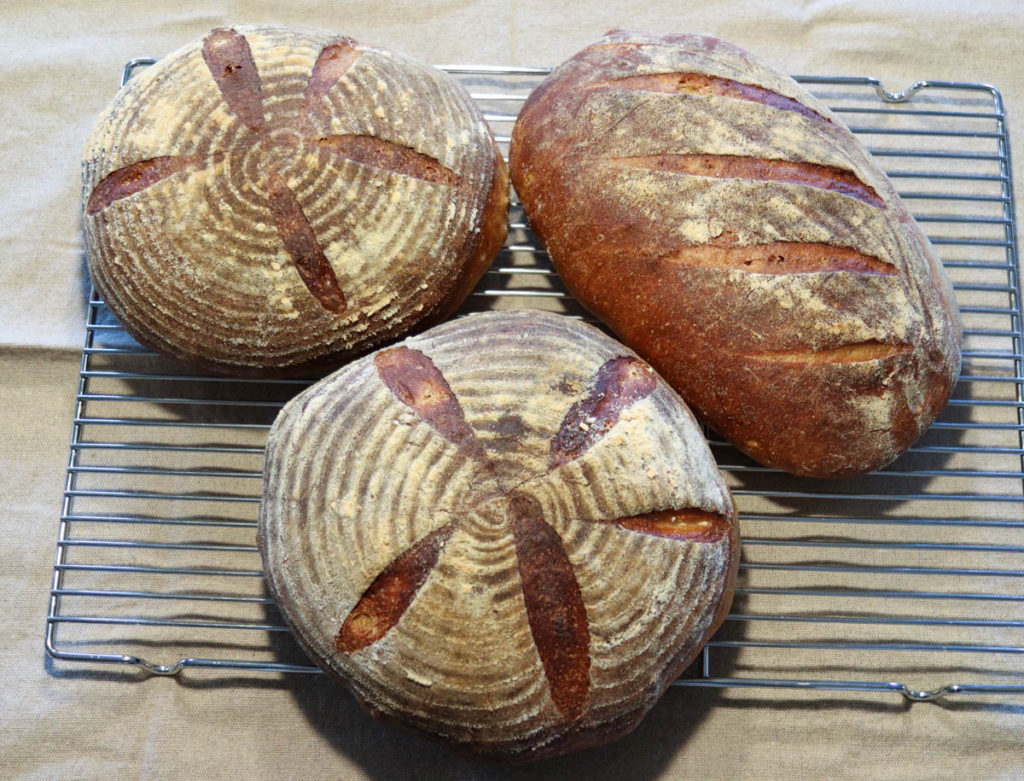 But let’s go back to the very beginning. Over the years I had bought some books about bread baking but, after trying a few recipes with modest results, it was my new intolerance to gluten that made me quit my efforts. As a consolation, I had told myself that normally cooks are not good bakers anyway, the typical excuse being that cooking requires more intuition and is more forgiving (as in: you can always add more salt later) while baking requires precision (sorry, but if you forgot the vanilla, you cannot add it later).
Still, both my husband and I were missing the good bread that we grew up with in Italy and I kept asking myself if there was any grain other than wheat that would not trigger my intolerance. I also wondered if the gluten was indeed the problem or if the culprits might be that all those genetic modifications to wheat to make it more resistant to pests and disease, or the synthetic fertilizers and pesticides used to grow it, and chemicals (many of which have been banned in Europe for decades) added to the flour.
Then, during a vacation in Italy, I noticed that I could eat bread (and pizza, and focaccia, and grissini, etc.) without feeling bloated. Was the flour so different? Or perhaps was it the yeast that was different?
This topic came up during a conversation with our cousins and one of them asked me, “Have you ever tried making bread with mother yeast? I’ve heard that it makes bread much more digestible.”
Little did I know about mother yeast – and neither did she – but she had stirred my curiosity and interest.
Fast-forward a few busy months later, our dear friend Dante invited us to try his homemade pizza. He had taken the rare opportunity of being between jobs to go to Naples and get certified as an Authentic Pizzaiolo. I love pizza and the ones Dante made that evening were outstanding: real Neapolitan pizzas, made with the right ingredients and a centuries-old method, cooked at the right temperature in a wood-burning oven, with the right type of wood.
If you have tried such a delicacy you can understand why Dante’s pizza made me feel in Heaven. If you haven’t and think that American pizza is the real deal, I can only recommend that you make Naples the destination of your next trip abroad or that you find an AVPN-certified pizzeria near you. The Vera Pizza Napoletana Association certifies that the pizzerias that displays its seal make excellent products of Neapolitan tradition, in accordance with its international disciplinary (which is eight pages long!)
I must admit that, besides enjoying Dante’s new skill, I was also a little wounded in my pride because I am the one who taught Dante how to make pizza many years ago and his newly acquired skills made evident that the student had surpassed the teacher by a good measure.
While passing through Dante’s kitchen, I noticed a bread machine and I asked him if he also made bread.
“Oh yes,” he answered, “I have tried to bake it in the pizza oven but it’s too time-consuming. The machine produces good-enough results and it’s easier”.
“And do you use mother yeast?” I pressed on.
“Again,” he answered “it’s too time consuming to keep the yeast alive and with the new job I will be traveling often.”
Aha, I thought, maybe I can regain my pole position by making better bread…
Dante kindly suggested a couple of good books about bread making.
Tartine Book nr.1 looked the most promising for what I wanted to achieve. I bought the book and all the necessary tools, made my own starter (the famous mother yeast), and began baking bread.
The first results were great for my always supporting husband but disappointing for me, especially considering all the time, study, effort, anticipation, and sweat I had invested into those loaves of bread.
But let’s go back to the very beginning. Over the years I had bought some books about bread baking but, after trying a few recipes with modest results, it was my new intolerance to gluten that made me quit my efforts. As a consolation, I had told myself that normally cooks are not good bakers anyway, the typical excuse being that cooking requires more intuition and is more forgiving (as in: you can always add more salt later) while baking requires precision (sorry, but if you forgot the vanilla, you cannot add it later).
Still, both my husband and I were missing the good bread that we grew up with in Italy and I kept asking myself if there was any grain other than wheat that would not trigger my intolerance. I also wondered if the gluten was indeed the problem or if the culprits might be that all those genetic modifications to wheat to make it more resistant to pests and disease, or the synthetic fertilizers and pesticides used to grow it, and chemicals (many of which have been banned in Europe for decades) added to the flour.
Then, during a vacation in Italy, I noticed that I could eat bread (and pizza, and focaccia, and grissini, etc.) without feeling bloated. Was the flour so different? Or perhaps was it the yeast that was different?
This topic came up during a conversation with our cousins and one of them asked me, “Have you ever tried making bread with mother yeast? I’ve heard that it makes bread much more digestible.”
Little did I know about mother yeast – and neither did she – but she had stirred my curiosity and interest.
Fast-forward a few busy months later, our dear friend Dante invited us to try his homemade pizza. He had taken the rare opportunity of being between jobs to go to Naples and get certified as an Authentic Pizzaiolo. I love pizza and the ones Dante made that evening were outstanding: real Neapolitan pizzas, made with the right ingredients and a centuries-old method, cooked at the right temperature in a wood-burning oven, with the right type of wood.
If you have tried such a delicacy you can understand why Dante’s pizza made me feel in Heaven. If you haven’t and think that American pizza is the real deal, I can only recommend that you make Naples the destination of your next trip abroad or that you find an AVPN-certified pizzeria near you. The Vera Pizza Napoletana Association certifies that the pizzerias that displays its seal make excellent products of Neapolitan tradition, in accordance with its international disciplinary (which is eight pages long!)
I must admit that, besides enjoying Dante’s new skill, I was also a little wounded in my pride because I am the one who taught Dante how to make pizza many years ago and his newly acquired skills made evident that the student had surpassed the teacher by a good measure.
While passing through Dante’s kitchen, I noticed a bread machine and I asked him if he also made bread.
“Oh yes,” he answered, “I have tried to bake it in the pizza oven but it’s too time-consuming. The machine produces good-enough results and it’s easier”.
“And do you use mother yeast?” I pressed on.
“Again,” he answered “it’s too time consuming to keep the yeast alive and with the new job I will be traveling often.”
Aha, I thought, maybe I can regain my pole position by making better bread…
Dante kindly suggested a couple of good books about bread making.
Tartine Book nr.1 looked the most promising for what I wanted to achieve. I bought the book and all the necessary tools, made my own starter (the famous mother yeast), and began baking bread.
The first results were great for my always supporting husband but disappointing for me, especially considering all the time, study, effort, anticipation, and sweat I had invested into those loaves of bread.
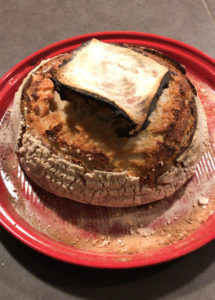 I felt frustrated, not as much for the outcome but because I couldn’t fully grasp what I was doing and why I was doing it. I wanted to understand the chemistry behind each step of the baking process, why certain flours needed more time to raise while others needed less, and I wanted to make the whole process mine so that I could play, have fun, and experiment with it.
Luckily, my town has a fantastic Culinary Institute with an outstanding baking program and, even more luckily, I found out that it offered a class in Artisan Bread Baking.
As I always say, if you have to learn something new, learn it from professionals; so I immediately enrolled in that class despite the discouraging fact that it started at 6:00am.
Here I am in my brand-new uniform on my first day of class, standing in front of the oven in which I bake my bread.
I felt frustrated, not as much for the outcome but because I couldn’t fully grasp what I was doing and why I was doing it. I wanted to understand the chemistry behind each step of the baking process, why certain flours needed more time to raise while others needed less, and I wanted to make the whole process mine so that I could play, have fun, and experiment with it.
Luckily, my town has a fantastic Culinary Institute with an outstanding baking program and, even more luckily, I found out that it offered a class in Artisan Bread Baking.
As I always say, if you have to learn something new, learn it from professionals; so I immediately enrolled in that class despite the discouraging fact that it started at 6:00am.
Here I am in my brand-new uniform on my first day of class, standing in front of the oven in which I bake my bread.
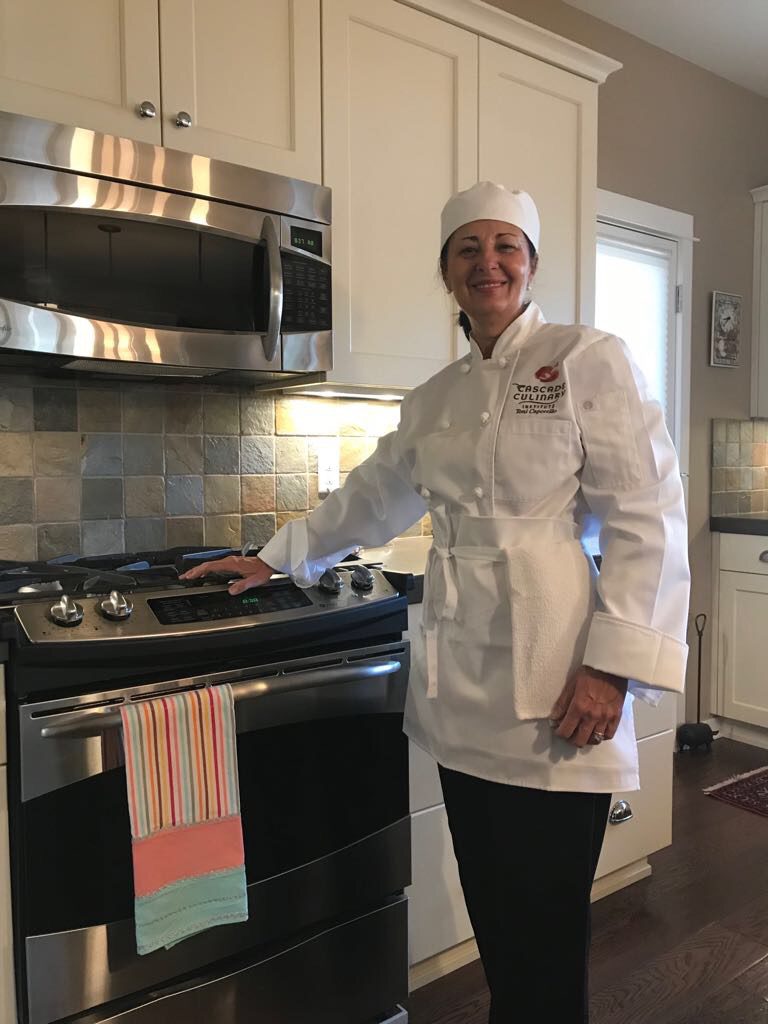 It’s amazing how much you can learn in three months if you are motivated and you have a good teacher. And, in the process, you can have a lot of fun, especially if most of your classmates are one third of your age, as in my case.
I will never forget the day we were making brioche bread and I asked my 19-year-old teammate if he knew how to separate an egg. He raised one eyebrow as if to say: “Hey, old lady, do think you are the only one here who can bake?”
I already suspected what he was going to do, but I let him plop the whole content of four eggs in a bowl. He looked at me with a very satisfied smile as if to say “See? Easy!”
Fortunately, the chef was behind him and I didn’t have to comment anything. It was her job to point out: “That is called ‘breaking’ eggs, not separating them.”
Besides many more hilarious episodes like this that made the workload feel much lighter, it was also the anticipation of my results and the speed at which I was learning that made me get to the kitchen much earlier than 6:00am on most mornings. And, during those three months, I made my friends and neighbors very happy with the results of my experiments, while in turn they made me even happier with their comments. One neighbor told me that their son had improved his swimming record thanks to my baguettes and brioches; another one said, half joking, “I heard you gave Kate some fabulous rye bread. You can have my garage door code in case I am not home when you make more.”
The Artisan Breads class gave me a good foundation to build up on but, like any other learning experience in a new field, it was like a driver’s license: it proves that you can drive but you need a lot of practice to become a good driver.
So I have kept baking with new methods, ingredients and different flours, and today I have reached the level of skill and understanding that produces the results I was looking for.
It’s amazing how much you can learn in three months if you are motivated and you have a good teacher. And, in the process, you can have a lot of fun, especially if most of your classmates are one third of your age, as in my case.
I will never forget the day we were making brioche bread and I asked my 19-year-old teammate if he knew how to separate an egg. He raised one eyebrow as if to say: “Hey, old lady, do think you are the only one here who can bake?”
I already suspected what he was going to do, but I let him plop the whole content of four eggs in a bowl. He looked at me with a very satisfied smile as if to say “See? Easy!”
Fortunately, the chef was behind him and I didn’t have to comment anything. It was her job to point out: “That is called ‘breaking’ eggs, not separating them.”
Besides many more hilarious episodes like this that made the workload feel much lighter, it was also the anticipation of my results and the speed at which I was learning that made me get to the kitchen much earlier than 6:00am on most mornings. And, during those three months, I made my friends and neighbors very happy with the results of my experiments, while in turn they made me even happier with their comments. One neighbor told me that their son had improved his swimming record thanks to my baguettes and brioches; another one said, half joking, “I heard you gave Kate some fabulous rye bread. You can have my garage door code in case I am not home when you make more.”
The Artisan Breads class gave me a good foundation to build up on but, like any other learning experience in a new field, it was like a driver’s license: it proves that you can drive but you need a lot of practice to become a good driver.
So I have kept baking with new methods, ingredients and different flours, and today I have reached the level of skill and understanding that produces the results I was looking for.
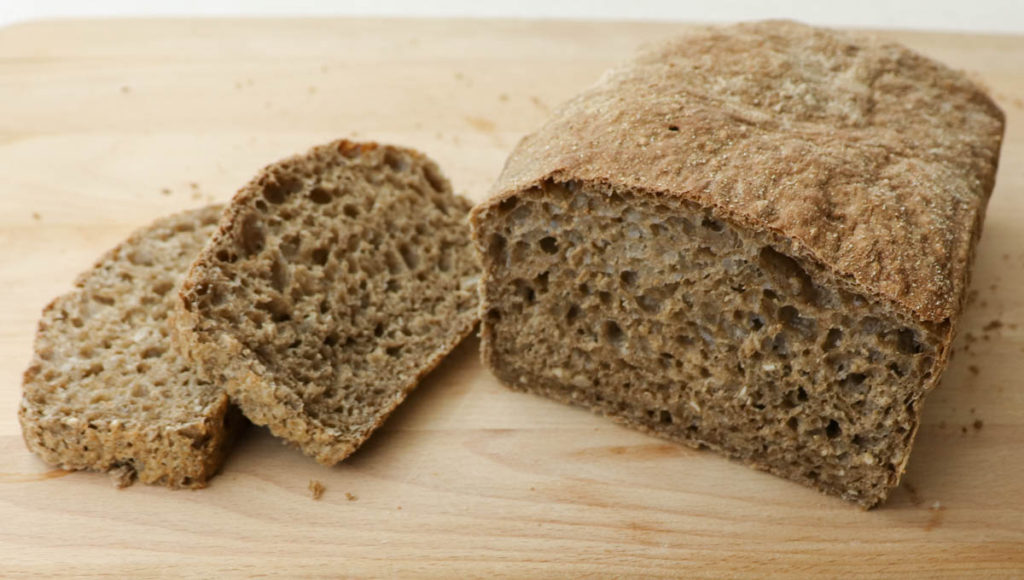 But, most of all, that class gave me a treasure of fond memories: the camaraderie and the jokes of my classmates; the hard work that made me feel rejuvenated; the improvised breakfasts with the warm bread, French butter and the espresso coffee made with an old Italian coffee maker I brought from home; the experimenting with flour, yeast, water and salt, and the marveling at the many different results that those four simple but magic ingredients can produce.
As Dante had told me, baking bread takes time. It also takes experience, patience, skill, commitment, but I have found out that it’s mainly a labor of love. And when love is one of the ingredients, the results are very rewarding.
But, most of all, that class gave me a treasure of fond memories: the camaraderie and the jokes of my classmates; the hard work that made me feel rejuvenated; the improvised breakfasts with the warm bread, French butter and the espresso coffee made with an old Italian coffee maker I brought from home; the experimenting with flour, yeast, water and salt, and the marveling at the many different results that those four simple but magic ingredients can produce.
As Dante had told me, baking bread takes time. It also takes experience, patience, skill, commitment, but I have found out that it’s mainly a labor of love. And when love is one of the ingredients, the results are very rewarding.
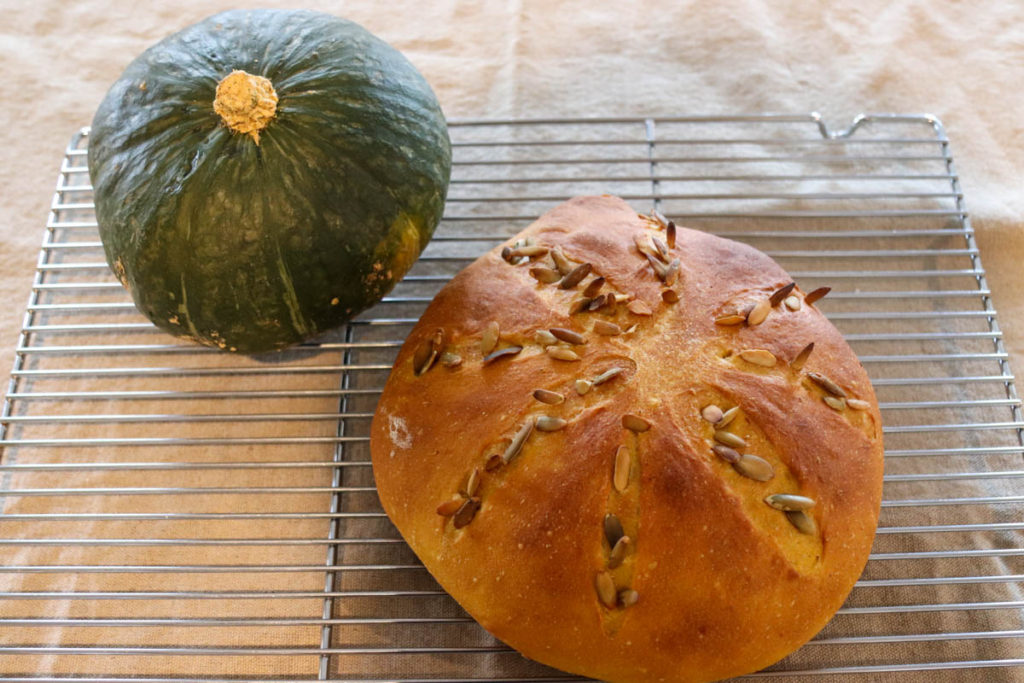
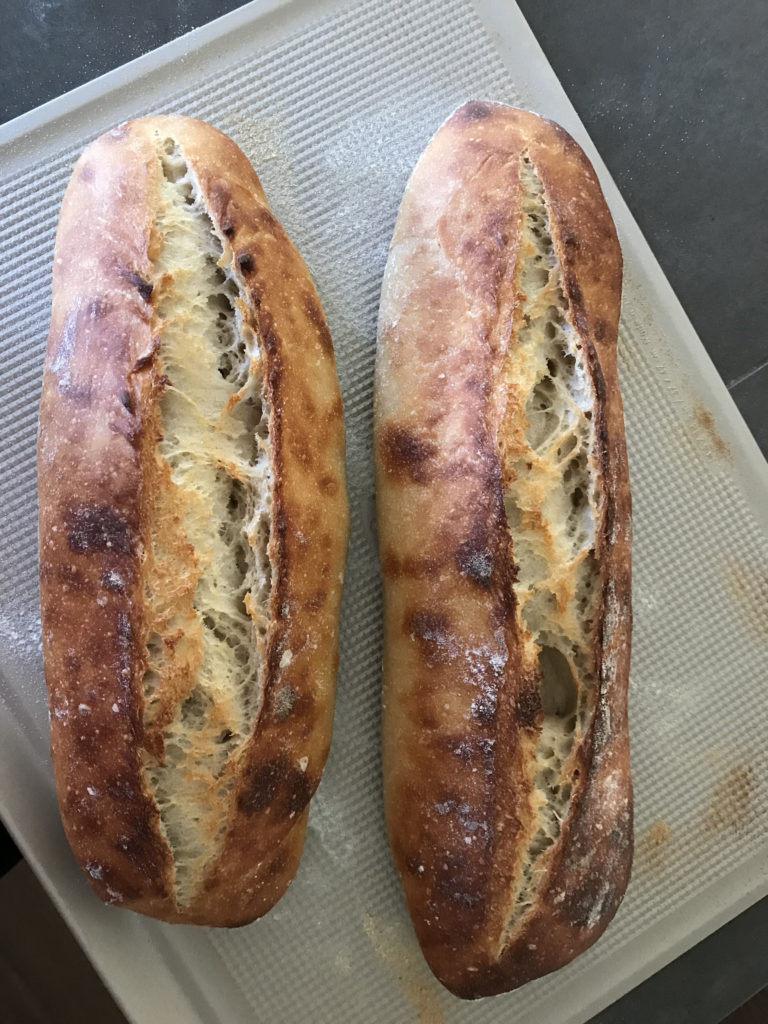
BAKING MY OWN BREAD!
 But let’s go back to the very beginning. Over the years I had bought some books about bread baking but, after trying a few recipes with modest results, it was my new intolerance to gluten that made me quit my efforts. As a consolation, I had told myself that normally cooks are not good bakers anyway, the typical excuse being that cooking requires more intuition and is more forgiving (as in: you can always add more salt later) while baking requires precision (sorry, but if you forgot the vanilla, you cannot add it later).
Still, both my husband and I were missing the good bread that we grew up with in Italy and I kept asking myself if there was any grain other than wheat that would not trigger my intolerance. I also wondered if the gluten was indeed the problem or if the culprits might be that all those genetic modifications to wheat to make it more resistant to pests and disease, or the synthetic fertilizers and pesticides used to grow it, and chemicals (many of which have been banned in Europe for decades) added to the flour.
Then, during a vacation in Italy, I noticed that I could eat bread (and pizza, and focaccia, and grissini, etc.) without feeling bloated. Was the flour so different? Or perhaps was it the yeast that was different?
This topic came up during a conversation with our cousins and one of them asked me, “Have you ever tried making bread with mother yeast? I’ve heard that it makes bread much more digestible.”
Little did I know about mother yeast – and neither did she – but she had stirred my curiosity and interest.
Fast-forward a few busy months later, our dear friend Dante invited us to try his homemade pizza. He had taken the rare opportunity of being between jobs to go to Naples and get certified as an Authentic Pizzaiolo. I love pizza and the ones Dante made that evening were outstanding: real Neapolitan pizzas, made with the right ingredients and a centuries-old method, cooked at the right temperature in a wood-burning oven, with the right type of wood.
If you have tried such a delicacy you can understand why Dante’s pizza made me feel in Heaven. If you haven’t and think that American pizza is the real deal, I can only recommend that you make Naples the destination of your next trip abroad or that you find an AVPN-certified pizzeria near you. The Vera Pizza Napoletana Association certifies that the pizzerias that displays its seal make excellent products of Neapolitan tradition, in accordance with its international disciplinary (which is eight pages long!)
I must admit that, besides enjoying Dante’s new skill, I was also a little wounded in my pride because I am the one who taught Dante how to make pizza many years ago and his newly acquired skills made evident that the student had surpassed the teacher by a good measure.
While passing through Dante’s kitchen, I noticed a bread machine and I asked him if he also made bread.
“Oh yes,” he answered, “I have tried to bake it in the pizza oven but it’s too time-consuming. The machine produces good-enough results and it’s easier”.
“And do you use mother yeast?” I pressed on.
“Again,” he answered “it’s too time consuming to keep the yeast alive and with the new job I will be traveling often.”
Aha, I thought, maybe I can regain my pole position by making better bread…
Dante kindly suggested a couple of good books about bread making.
Tartine Book nr.1 looked the most promising for what I wanted to achieve. I bought the book and all the necessary tools, made my own starter (the famous mother yeast), and began baking bread.
The first results were great for my always supporting husband but disappointing for me, especially considering all the time, study, effort, anticipation, and sweat I had invested into those loaves of bread.
But let’s go back to the very beginning. Over the years I had bought some books about bread baking but, after trying a few recipes with modest results, it was my new intolerance to gluten that made me quit my efforts. As a consolation, I had told myself that normally cooks are not good bakers anyway, the typical excuse being that cooking requires more intuition and is more forgiving (as in: you can always add more salt later) while baking requires precision (sorry, but if you forgot the vanilla, you cannot add it later).
Still, both my husband and I were missing the good bread that we grew up with in Italy and I kept asking myself if there was any grain other than wheat that would not trigger my intolerance. I also wondered if the gluten was indeed the problem or if the culprits might be that all those genetic modifications to wheat to make it more resistant to pests and disease, or the synthetic fertilizers and pesticides used to grow it, and chemicals (many of which have been banned in Europe for decades) added to the flour.
Then, during a vacation in Italy, I noticed that I could eat bread (and pizza, and focaccia, and grissini, etc.) without feeling bloated. Was the flour so different? Or perhaps was it the yeast that was different?
This topic came up during a conversation with our cousins and one of them asked me, “Have you ever tried making bread with mother yeast? I’ve heard that it makes bread much more digestible.”
Little did I know about mother yeast – and neither did she – but she had stirred my curiosity and interest.
Fast-forward a few busy months later, our dear friend Dante invited us to try his homemade pizza. He had taken the rare opportunity of being between jobs to go to Naples and get certified as an Authentic Pizzaiolo. I love pizza and the ones Dante made that evening were outstanding: real Neapolitan pizzas, made with the right ingredients and a centuries-old method, cooked at the right temperature in a wood-burning oven, with the right type of wood.
If you have tried such a delicacy you can understand why Dante’s pizza made me feel in Heaven. If you haven’t and think that American pizza is the real deal, I can only recommend that you make Naples the destination of your next trip abroad or that you find an AVPN-certified pizzeria near you. The Vera Pizza Napoletana Association certifies that the pizzerias that displays its seal make excellent products of Neapolitan tradition, in accordance with its international disciplinary (which is eight pages long!)
I must admit that, besides enjoying Dante’s new skill, I was also a little wounded in my pride because I am the one who taught Dante how to make pizza many years ago and his newly acquired skills made evident that the student had surpassed the teacher by a good measure.
While passing through Dante’s kitchen, I noticed a bread machine and I asked him if he also made bread.
“Oh yes,” he answered, “I have tried to bake it in the pizza oven but it’s too time-consuming. The machine produces good-enough results and it’s easier”.
“And do you use mother yeast?” I pressed on.
“Again,” he answered “it’s too time consuming to keep the yeast alive and with the new job I will be traveling often.”
Aha, I thought, maybe I can regain my pole position by making better bread…
Dante kindly suggested a couple of good books about bread making.
Tartine Book nr.1 looked the most promising for what I wanted to achieve. I bought the book and all the necessary tools, made my own starter (the famous mother yeast), and began baking bread.
The first results were great for my always supporting husband but disappointing for me, especially considering all the time, study, effort, anticipation, and sweat I had invested into those loaves of bread.
 I felt frustrated, not as much for the outcome but because I couldn’t fully grasp what I was doing and why I was doing it. I wanted to understand the chemistry behind each step of the baking process, why certain flours needed more time to raise while others needed less, and I wanted to make the whole process mine so that I could play, have fun, and experiment with it.
Luckily, my town has a fantastic Culinary Institute with an outstanding baking program and, even more luckily, I found out that it offered a class in Artisan Bread Baking.
As I always say, if you have to learn something new, learn it from professionals; so I immediately enrolled in that class despite the discouraging fact that it started at 6:00am.
Here I am in my brand-new uniform on my first day of class, standing in front of the oven in which I bake my bread.
I felt frustrated, not as much for the outcome but because I couldn’t fully grasp what I was doing and why I was doing it. I wanted to understand the chemistry behind each step of the baking process, why certain flours needed more time to raise while others needed less, and I wanted to make the whole process mine so that I could play, have fun, and experiment with it.
Luckily, my town has a fantastic Culinary Institute with an outstanding baking program and, even more luckily, I found out that it offered a class in Artisan Bread Baking.
As I always say, if you have to learn something new, learn it from professionals; so I immediately enrolled in that class despite the discouraging fact that it started at 6:00am.
Here I am in my brand-new uniform on my first day of class, standing in front of the oven in which I bake my bread.
 It’s amazing how much you can learn in three months if you are motivated and you have a good teacher. And, in the process, you can have a lot of fun, especially if most of your classmates are one third of your age, as in my case.
I will never forget the day we were making brioche bread and I asked my 19-year-old teammate if he knew how to separate an egg. He raised one eyebrow as if to say: “Hey, old lady, do think you are the only one here who can bake?”
I already suspected what he was going to do, but I let him plop the whole content of four eggs in a bowl. He looked at me with a very satisfied smile as if to say “See? Easy!”
Fortunately, the chef was behind him and I didn’t have to comment anything. It was her job to point out: “That is called ‘breaking’ eggs, not separating them.”
Besides many more hilarious episodes like this that made the workload feel much lighter, it was also the anticipation of my results and the speed at which I was learning that made me get to the kitchen much earlier than 6:00am on most mornings. And, during those three months, I made my friends and neighbors very happy with the results of my experiments, while in turn they made me even happier with their comments. One neighbor told me that their son had improved his swimming record thanks to my baguettes and brioches; another one said, half joking, “I heard you gave Kate some fabulous rye bread. You can have my garage door code in case I am not home when you make more.”
The Artisan Breads class gave me a good foundation to build up on but, like any other learning experience in a new field, it was like a driver’s license: it proves that you can drive but you need a lot of practice to become a good driver.
So I have kept baking with new methods, ingredients and different flours, and today I have reached the level of skill and understanding that produces the results I was looking for.
It’s amazing how much you can learn in three months if you are motivated and you have a good teacher. And, in the process, you can have a lot of fun, especially if most of your classmates are one third of your age, as in my case.
I will never forget the day we were making brioche bread and I asked my 19-year-old teammate if he knew how to separate an egg. He raised one eyebrow as if to say: “Hey, old lady, do think you are the only one here who can bake?”
I already suspected what he was going to do, but I let him plop the whole content of four eggs in a bowl. He looked at me with a very satisfied smile as if to say “See? Easy!”
Fortunately, the chef was behind him and I didn’t have to comment anything. It was her job to point out: “That is called ‘breaking’ eggs, not separating them.”
Besides many more hilarious episodes like this that made the workload feel much lighter, it was also the anticipation of my results and the speed at which I was learning that made me get to the kitchen much earlier than 6:00am on most mornings. And, during those three months, I made my friends and neighbors very happy with the results of my experiments, while in turn they made me even happier with their comments. One neighbor told me that their son had improved his swimming record thanks to my baguettes and brioches; another one said, half joking, “I heard you gave Kate some fabulous rye bread. You can have my garage door code in case I am not home when you make more.”
The Artisan Breads class gave me a good foundation to build up on but, like any other learning experience in a new field, it was like a driver’s license: it proves that you can drive but you need a lot of practice to become a good driver.
So I have kept baking with new methods, ingredients and different flours, and today I have reached the level of skill and understanding that produces the results I was looking for.
 But, most of all, that class gave me a treasure of fond memories: the camaraderie and the jokes of my classmates; the hard work that made me feel rejuvenated; the improvised breakfasts with the warm bread, French butter and the espresso coffee made with an old Italian coffee maker I brought from home; the experimenting with flour, yeast, water and salt, and the marveling at the many different results that those four simple but magic ingredients can produce.
As Dante had told me, baking bread takes time. It also takes experience, patience, skill, commitment, but I have found out that it’s mainly a labor of love. And when love is one of the ingredients, the results are very rewarding.
But, most of all, that class gave me a treasure of fond memories: the camaraderie and the jokes of my classmates; the hard work that made me feel rejuvenated; the improvised breakfasts with the warm bread, French butter and the espresso coffee made with an old Italian coffee maker I brought from home; the experimenting with flour, yeast, water and salt, and the marveling at the many different results that those four simple but magic ingredients can produce.
As Dante had told me, baking bread takes time. It also takes experience, patience, skill, commitment, but I have found out that it’s mainly a labor of love. And when love is one of the ingredients, the results are very rewarding.



